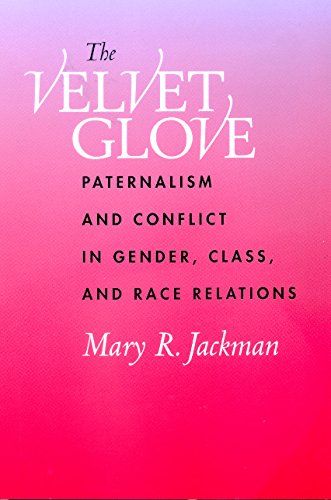The Velvet Glove
Paternalism and Conflict in Gender, Class, and Race Relations
Mary R. Jackman
BOOK REVIEW

In the vast landscape of scholarly critique, The Velvet Glove: Paternalism and Conflict in Gender, Class, and Race Relations by Mary R. Jackman emerges as a monumental text that grapples with the complex interplay of power, identity, and societal structure. This profound work challenges readers to confront the subtle yet pervasive forms of paternalism entrenched within our everyday lives, particularly as they manifest through gender, class, and race.
Jackman's incisive examination cuts through the superficial layers of social interaction to expose the often unspoken tensions that simmer beneath the surface. She deftly navigates historical contexts and theoretical frameworks, presenting a dazzling array of arguments that force you to reconsider the very essence of authority and subjugation-a call that resonates deeply in today's charged sociopolitical climate.
At its core, The Velvet Glove does not merely delineate issues; it evokes a visceral response. Jackman compels you to feel the weight of institutional oppression, urging a reckoning with the ramifications of paternalism. Her analysis reveals not just the historical roots of these conflicts but also their grotesque manifestations in contemporary culture. Feminism, labor relations, and racial dynamics are not isolated themes; they are interwoven threads in a fabric that is both fragile and resilient.
Readers are taken on an emotional rollercoaster, gripped by the audacity of Jackman's insights. Critics have lauded her ability to blend theory with lived experience, making abstract concepts tangible. Yet, the book has not escaped scrutiny. Detractors argue that Jackman's approach at times verges on idealism, a critique suggesting that her vision may overlook the complexities of human agency in oppressive systems. Others echo the sentiment that although her arguments are undeniably powerful, they can at times feel overwhelming, leaving little room for optimism.
However, this tension itself is what makes The Velvet Glove a must-read. It's an invitation to sit uncomfortably with conflict, a call to acknowledge the imperfections of the world while striving for change. The implications of her work extend beyond academia, influencing activists, policymakers, and even artists who grapple with these same themes in their work. The echoes of her thought reverberate through contemporary discussions about equality and justice, shaping the ideologies that drive movements forward.
Diving into Jackman's research feels like peeling back layers of an onion-each layer exposing another truth, another discomfort. Her narrative style, punctuated by strong, evocative language, pulls you into a conversation that feels urgent and necessary. You cannot help but confront your own beliefs, fears, and assumptions as you navigate through her arguments. The haunting realization of how deeply rooted these issues are in the fabric of American society leaves you both reflective and, quite frankly, disturbed.
As you consider how paternalism operates and how it continues to evolve, remember that The Velvet Glove is not just an academic text-it is a clarion call. It challenges you to engage with the world around you actively and critically, opening the door to a dialogue that is often avoided. The stakes are high, and ignoring the realities laid bare in this work is no longer an option.
Now more than ever, as we witness the resurgence of voices demanding justice and equity, Jackman's work stands as a beacon of insight, urging us not to look away but to confront the uncomfortable truths of our collective existence. Will you answer the call? 🌍
📖 The Velvet Glove: Paternalism and Conflict in Gender, Class, and Race Relations
✍ by Mary R. Jackman
🧾 432 pages
1996
#velvet #glove #paternalism #conflict #gender #class #race #relations #mary #jackman #MaryRJackman